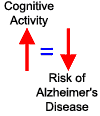 | Use Your Brain to Reduce the Risk of Alzheimer's Disease |
 | Use Your Brain to Reduce the Risk of Alzheimer's Disease |
 February 15, 2002
February 15, 2002Last month researchers demonstrated that complex thinking may provide a boost to the immune system. A new study published in the February 13, 2002 issue of The Journal of the American Medical Association suggests that mentally challenging activities may protect people from Alzheimer's disease. Scientists followed 740 members of the Catholic clergy (nuns, priests and brothers) for an average of 4.5 years. At the start of the study, none of these people had any signs of Alzheimer's disease. At each visit with the scientists, the participants were asked about the time they spent doing certain activities. |
 |
Activities Measured
|
 |
Each person received points for how often they
engaged in each activity:
The scientists then calculated an average activity score. Participants were also given a series of 20 tests to measure their cognitive abilities. Over the follow-up years, 111 of the original participants developed symptoms of Alzheimer's disease. Researchers found that more frequent cognitive activity (higher activity scores) REDUCED the chance that a person would develop symptoms of Alzheimer's disease. In fact, a 1-point increase in the activity score was associated with a 33% reduction in the risk of developing Alzheimer's disease.
The reason why increased cognitive activity reduces the risk for
Alzheimer's disease is not known. It may be that challenging mental
activities protect the brain from the damage of Alzheimer's disease or
somehow strengthen existing neuronal connections. Additional research is
necessary to discover the mechanisms that are responsible for these
findings. Nevertheless, this research reinforces the old saying about the
brain: |
|
References:
|
| GO TO: | Neuroscience In The News | Explore the Nervous System | Table of Contents |
![[email]](./gif/menue.gif) Send E-mail |
 Fill out survey |
 Get Newsletter |
 Search Pages |
 Take Notes |